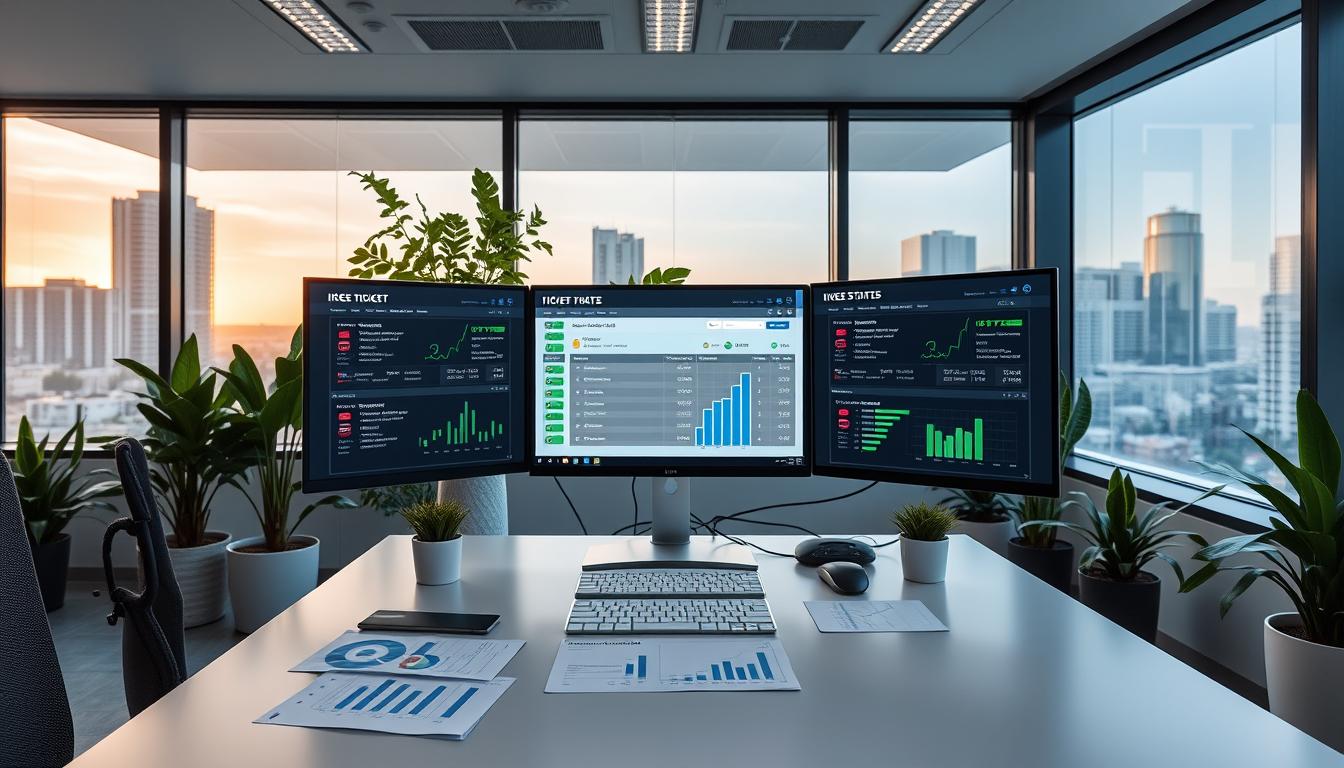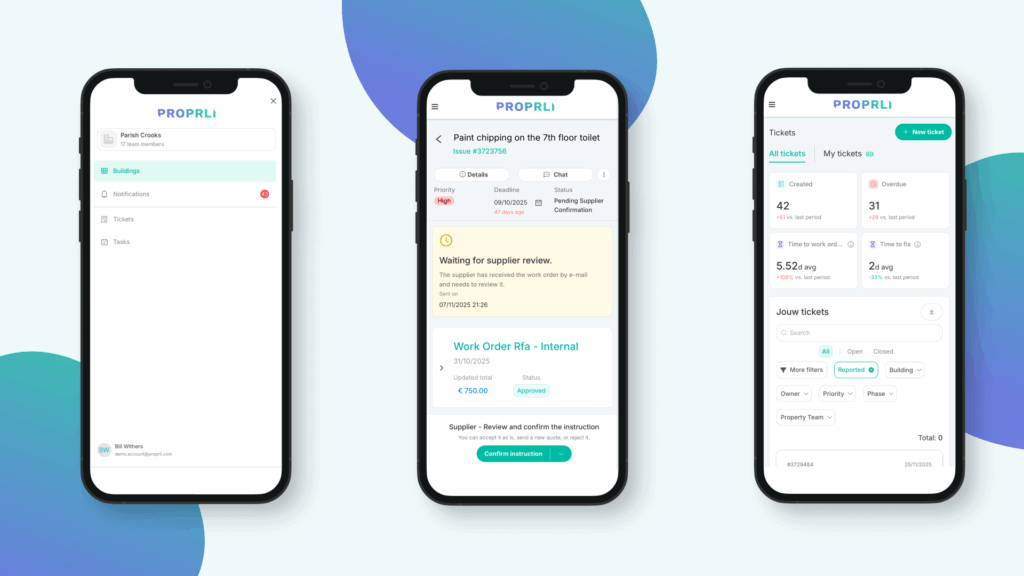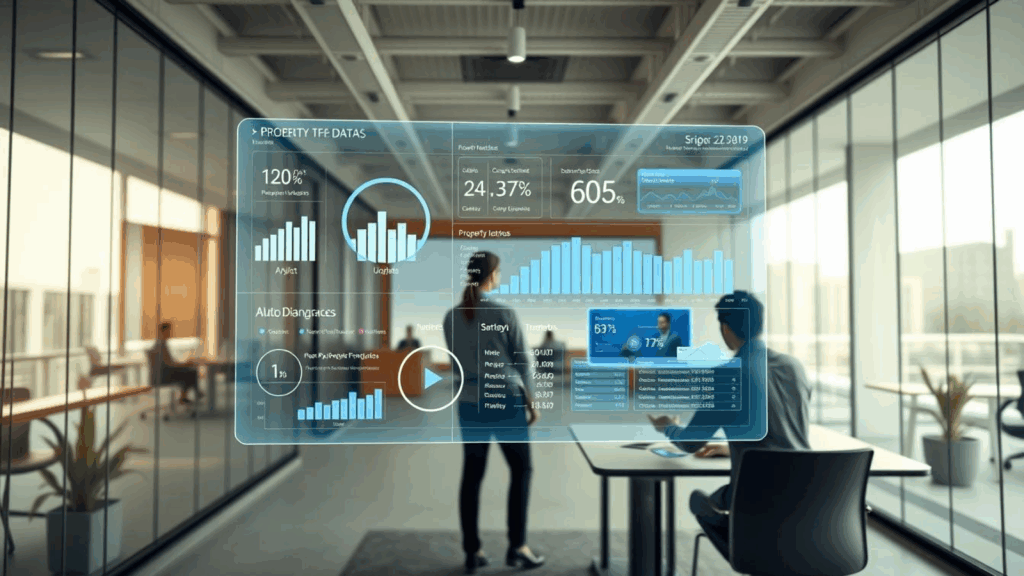The rental market is expanding, with homeownership rates dropping for over 8 years. Property managers are looking for ways to improve their operations and tenant satisfaction. A property management ticketing system is key for efficient issue tracking and resolution. It helps manage property maintenance requests and tenant issue tracking smoothly.
Using facility management software or a property operations platform is crucial. It centralizes all maintenance requests, work orders, and tenant communications in one place. This approach saves time, cuts down on unnecessary site visits, and ensures no issue is overlooked. It leads to quicker resolutions and higher tenant satisfaction.
Key Takeaways:
- Property management ticketing systems streamline issue tracking and resolution
- Centralized platform for handling maintenance requests and tenant communications
- Reduces unnecessary site visits and saves time for property managers
- Faster resolution times lead to improved tenant satisfaction
- Essential tool for efficient property operations and management
The Importance of a Robust Property Management Ticketing System
In today’s fast-paced property management world, efficiency and organization are paramount. A robust ticketing system is crucial for streamlining workflows, enhancing communication, and boosting tenant satisfaction. It allows property managers to track and resolve issues efficiently, automate tasks, and gain insights into their operations.
A key advantage of a property management ticketing system is its ability to centralize and prioritize maintenance requests. Maintenance issues are a common source of tenant complaints. Thus, having a reliable system to manage these requests is essential. It ensures that tenants can easily submit their concerns, and property managers can address them promptly.
Furthermore, a robust ticketing system can reduce customer frustration by automating processes and enhancing service efficiency. By using real estate workflow automation, property managers can reduce manual tasks, streamline communication, and ensure tickets are assigned correctly. This approach saves time, reduces errors, and leads to a more efficient resolution process.
| Feature | Benefit |
|---|---|
| Centralized maintenance requests | Ensures no issue goes unnoticed and prioritizes requests |
| Automated processes | Minimizes manual tasks and reduces the likelihood of human error |
| Analytics and reporting | Provides valuable insights into team performance and issue frequency |
| Ticket escalation | Ensures quicker and more effective issue resolution when problems cannot be solved at the initial level |
A property management ticketing system also offers valuable analytics and reporting features. By tracking metrics like resolution and response times, property managers can understand their team’s performance and identify areas for improvement. Additionally, tracking issue frequency helps identify recurring problems, enabling proactive measures to prevent them.
Effective communication is another critical aspect of a robust ticketing system. It provides a centralized platform for all service records, ensuring everyone involved has access to the latest information. This transparency improves collaboration and accountability, as each team member can see their responsibilities and ticket progress.
In conclusion, investing in a robust property management ticketing system is a wise choice for property managers. It streamlines operations, enhances tenant satisfaction, and drives long-term success. By leveraging real estate workflow automation and a reliable landlord ticketing solution, property managers can elevate their service delivery and achieve a more efficient, effective, and profitable business.
Key Features of an Effective Property Management Ticketing System
Choosing the right property management ticketing system is vital. It must offer a wide range of features to simplify issue tracking and resolution. A top-notch system should enable omnichannel ticket management. This means property managers can handle tickets from various sources like email, phone, and web forms in one place.
AI-powered chatbots are a must-have feature. They can address routine tenant queries and offer immediate help. This reduces the workload on property management teams. Customizable automation workflows are also crucial. They allow property managers to automate routine tasks, such as assigning tickets or sending notifications.
Advanced reporting and analytics are key for understanding ticket trends, response times, and team performance. A good system should come with a variety of pre-built reports and dashboards. It should also allow for custom reports to meet specific needs.
| Feature | Benefit |
|---|---|
| Omnichannel Ticket Management | Centralize tickets from multiple channels for efficient management |
| AI-Powered Chatbots | Provide instant assistance and reduce workload on property management teams |
| Customizable Automation Workflows | Automate repetitive tasks and streamline issue resolution processes |
| Advanced Reporting and Analytics | Gain insights into ticket trends, response times, and team performance |
| Native CRM Integration | Seamlessly access tenant information and communication history |
| Self-Service Knowledge Base | Empower tenants to find answers to common questions and reduce ticket volume |
Integration with a native CRM system is another valuable feature. It lets property managers access tenant data and communication history within the ticketing system. This integration enhances service quality and efficiency for tenants.
A self-service knowledge base is crucial for an effective ticketing system. It provides tenants with a vast library of articles, guides, and FAQs. This empowers tenants to solve common issues on their own, reducing ticket volume and freeing up time for more complex issues.
Streamlining Communication Between Tenants, Property Managers, and Maintenance Teams
Effective communication is crucial for successful property management. A property management ticketing system serves as a unified inbox, collecting requests from various sources like phone, email, web forms, and live chat. This central hub ensures no inquiry or request is missed, allowing for quick and effective service.
The ticketing system consolidates all communication into one platform, creating a detailed customer timeline. This timeline tracks a tenant’s journey from first contact to issue resolution. Property managers can monitor ticket progress, ensuring timely issue resolution.
Collision detection is a key feature of these systems. It prevents multiple agents from working on the same ticket, avoiding unnecessary duplication and confusion. With clear assignments and updates, maintenance teams can efficiently prioritize tasks based on urgency and importance.
| Benefits of a Property Management Ticketing System | Impact on Communication |
|---|---|
| Unified omnichannel inbox | Consolidates tenant inquiries and maintenance requests from multiple channels |
| Comprehensive customer timeline | Provides a complete overview of a tenant’s journey and issue resolution progress |
| Collision detection | Prevents multiple agents from working on the same ticket, avoiding duplicated efforts |
| Efficient collaboration | Enables maintenance teams to prioritize tasks and work together effectively |
A property management ticketing system streamlines communication, creating a more responsive and transparent environment. Tenants feel valued, knowing their concerns are addressed quickly. Property managers can monitor maintenance team performance, ensuring SLAs are met and tenant satisfaction is high.
Implementing such a system improves communication, enhances tenant relations, increases retention, and gives a competitive edge. Centralized communication and efficient issue resolution elevate the tenant experience, driving long-term success for properties.
Enhancing Tenant Satisfaction Through Prompt Issue Resolution
In the realm of property management, tenant satisfaction is paramount. It directly influences the success and profitability of the business. A property management ticketing system is essential for enhancing customer satisfaction. It ensures swift query resolution and efficient issue tracking. By promptly addressing tenants’ concerns, property managers can build a positive relationship. This leads to increased customer retention and loyalty.
A robust ticketing system streamlines communication between tenants, property managers, and maintenance teams. When a tenant reports an issue, the system creates a ticket. This tracks the problem’s progress from start to resolution. Transparency keeps tenants informed, reducing anxiety and frustration. Regular updates show tenants their concerns are being heard and addressed, building trust and appreciation.
Furthermore, a well-implemented ticketing system enables efficient task management. It categorizes and prioritizes tickets based on urgency and complexity. This ensures critical issues are addressed promptly, minimizing tenant inconvenience. Such proactive problem-solving enhances customer satisfaction and prevents minor issues from becoming major, costly problems.
| Benefit | Impact on Tenant Satisfaction |
|---|---|
| Swift query resolution | Increases tenant satisfaction by addressing concerns promptly |
| Transparent communication | Fosters trust and appreciation among tenants |
| Efficient task prioritization | Ensures critical issues are resolved quickly, minimizing tenant inconvenience |
| Personalized service | Tailored solutions cater to individual tenant preferences, boosting satisfaction |
A property management ticketing system also facilitates data collection and analysis. By examining ticket trends and tenant feedback, managers can pinpoint areas for improvement. This data-driven approach enables informed decisions that enhance tenant satisfaction and retention.
Implementing a property management ticketing system is crucial for elevating tenant satisfaction. It provides prompt issue resolution, transparent communication, and personalized service. These elements create a positive living experience for tenants. Happy tenants are more likely to renew leases, refer others, and contribute to the business’s long-term success. Investing in a robust ticketing system is a strategic move towards building lasting relationships with tenants.
Optimizing Maintenance Workflows with a Property Management Ticketing System
A well-designed property management ticketing system can greatly improve maintenance workflow efficiency. This leads to higher productivity and more streamlined processes. It automates tasks like ticket assignment, prioritization, and escalation. This frees up support agents to tackle more urgent issues and resolve them quickly.
The system allows property managers to monitor maintenance request status in real-time. This ensures prompt and efficient issue resolution. It also helps in effectively allocating maintenance team resources, reducing downtime and boosting tenant satisfaction.
Optimizing maintenance workflows with a property management ticketing system offers several benefits:
- Automated ticket assignment and prioritization based on predefined rules
- Streamlined communication between tenants, property managers, and maintenance teams
- Real-time tracking of maintenance request status and resolution progress
- Efficient resource allocation and workload management for maintenance teams
- Reduced response times and improved tenant satisfaction
By using automation and centralized communication, a property management ticketing system can greatly enhance maintenance workflows. This results in increased productivity, cost savings, and better tenant experiences. Such improvements are key to the success and growth of property management businesses.
Leveraging Data Analytics for Informed Decision Making
A property management ticketing system offers a treasure trove of data. This data is crucial for gaining insights into customer behavior and making strategic decisions. By examining metrics like common ticket types, response times, resolution times, and satisfaction scores, managers can pinpoint areas for enhancement. This leads to more efficient operations and better customer experiences.
Data analytics uncovers trends and patterns that might otherwise remain hidden. For example, analyzing the most common ticket types reveals recurring issues. This knowledge allows managers to take proactive steps, improving tenant satisfaction and reducing maintenance team workload.
Metrics like query response time and average ticket resolution time are key to tenant satisfaction. By tracking these and setting targets, managers ensure their teams provide prompt and effective support. Data analytics helps identify process bottlenecks, enabling managers to refine workflows and allocate resources more effectively.
| Metric | Impact |
|---|---|
| Common ticket types | Identifies recurring issues for proactive resolution |
| Query response time | Ensures timely support and enhances tenant satisfaction |
| Average ticket resolution time | Measures efficiency and helps optimize workflows |
| Customer satisfaction scores | Provides insight into tenant sentiment and areas for improvement |
Customer satisfaction scores are a key indicator of a property management team’s success. By tracking these scores and analyzing trends, managers can pinpoint strengths and weaknesses. This data-driven approach aids in making strategic decisions, such as staff training or investing in new technologies.
Data analytics also aids in optimizing maintenance workflows. By analyzing ticket data, managers can identify maintenance request patterns. This allows for the development of preventive maintenance schedules. Such proactive measures reduce reactive maintenance tasks, extend asset life, and save costs, all while improving tenant satisfaction.
In conclusion, using data analytics through a property management ticketing system empowers managers to make informed decisions. By analyzing various metrics, managers can continually refine their operations. This leads to enhanced tenant satisfaction and long-term success.
Integration with Other Property Management Software Solutions
Choosing a property management ticketing system requires evaluating its integration capabilities. It should smoothly connect with CRM, email, and other platforms for a unified view of operations. This integration streamlines communication, boosts customer service, and optimizes internal task management.
Software like Proprli, with an open API, facilitates data exchange with various tools. This includes accounting software, digital marketing platforms, and vendor software. Such integration automates tasks, like inspections and renter verifications, cutting staffing costs and boosting efficiency and profits.
| Integration Benefit | Impact |
|---|---|
| Accounting software integration | Streamlined task, project, and billing management with vendors across different property locations |
| CRM program integration | Comprehensive view of operations and enhanced customer service |
| Process automation through integration | Reduced staffing costs and increased operational efficiency |
| Consolidation of communication channels | Improved customer service and effective internal task management |
Property management software with open APIs offers flexibility. It allows for custom workflows, pet tracking, lease and application management, and staff relocation. This customization enhances operations and revenue. It also supports tasks like marketing strategy tracking, budgeting, and a broader business view.
Emphasizing seamless integration with other software solutions is key. It optimizes processes, enhances tenant satisfaction, and drives success in the competitive property management field.
Best Practices for Implementing a Property Management Ticketing System
Implementing a property management ticketing system demands meticulous planning and execution. It’s crucial to provide thorough team training on the new software. All team members should attend onboarding calls and use training modules and knowledge bases. This ensures they understand the system’s features and functionalities.
When migrating data from an existing system, careful handling is essential. It’s important to maintain data integrity, create backups, and prioritize tickets based on urgency and impact. This approach ensures no critical information is lost and the team can quickly adapt to the new system.
Customizing the software to meet the specific needs of the property management business is vital. Every organization has unique workflows and requirements. Tailoring the ticketing system to these needs enhances its effectiveness and user adoption. Collaborating with the software provider for customization is key.
Having real-time support from a dedicated vendor representative is invaluable during implementation. This support helps address issues, provides guidance on best practices, and ensures the team maximizes the software’s potential. A responsive and knowledgeable support team is crucial for a smooth implementation.
| Implementation Step | Best Practices |
|---|---|
| Team Training |
|
| Data Migration |
|
| Software Customization |
|
| Real-Time Support |
|
By adhering to these best practices and collaborating with the software provider, property management companies can effectively implement a ticketing system. This streamlines operations, improves tenant satisfaction, and drives long-term success.
Elevating Guest Experiences and Streamlining Operations
In the fast-paced hospitality industry, delivering exceptional guest experiences while maintaining streamlined operations is paramount. A comprehensive property management ticketing system can be a game-changer in achieving these goals. By efficiently tracking and resolving guest requests, maintenance issues, and service delivery, hotels can ensure that every guest feels valued and well-served throughout their stay.
The implementation of a service optimization solution, such as a ticketing system, can significantly decrease service delivery times and streamline staff’s daily activities. With features like preventative maintenance, service recovery, and work order checklists, these systems enable efficient management of tasks and resources. Real-time escalations and notifications further contribute to reducing service delivery times and enhancing the overall guest experience.
Moreover, a robust content management system allows hoteliers to make real-time updates to digital content across their property, including mobile apps and in-room tablets. The data generated by these in-room devices can provide valuable insights into popular services, dining preferences, and housekeeping requests. This empowers management teams to make data-driven decisions that cater to their guests’ needs.
| Feature | Benefit |
|---|---|
| Intuitive ticketing system | Streamlines guest requests and maintenance issues |
| PMS integration | Ensures real-time updates and seamless communication |
| Customizable workflow | Enables efficient task handling and resource allocation |
| Scheduled and recurring tasks | Helps stay ahead of routine operations |
| Custom escalation paths and ticket timers | Ensures timely issue resolution and enhanced guest satisfaction |
By leveraging the power of business intelligence analytics, hoteliers can gain a complete view of property activities and better understand guest preferences. This data-driven approach allows for personalized guest service, tailoring experiences based on guests’ reservations, stated preferences, and interactions with in-room devices. Meeting the expectations of modern travelers is crucial in today’s competitive hospitality landscape.
Ultimately, a comprehensive property management ticketing system, coupled with robust analytics and personalization capabilities, can elevate hotel operations by centralizing and streamlining tasks. This allows staff to focus on what matters most – delivering exceptional guest experiences that leave a lasting impression. With the right tools in place, hotels can transform challenges into opportunities for growth and operational excellence, setting themselves apart in the ever-evolving hospitality industry.
Choosing the Right Property Management Ticketing System
Choosing the right property management ticketing system is crucial for your business’s success. It’s vital to conduct a detailed business needs assessment. This ensures the system meets your specific requirements.
Scalability is key, as your business may grow. Look for a system that can handle more users and tickets without performance issues. A user-friendly interface is also crucial. It makes it easier for your staff to learn and use the system.
Free demonstrations and trial periods are invaluable. They let you test the system in real scenarios. This helps you see if it fits your workflows. Focus on features like customizable fields, automated assignment, and real-time updates.
- Customizable ticket fields and templates
- Automated ticket assignment and escalation
- Real-time notifications and updates
- Mobile accessibility for on-the-go property management
- Comprehensive reporting and analytics capabilities
Comparing systems, a feature comparison table is helpful. It highlights each system’s strengths and weaknesses. Here’s an example:
| Feature | System A | System B | System C |
|---|---|---|---|
| User-friendly interface | ✓ | ✓ | ✓ |
| Scalability | ✓ | ✓ | ✓ |
| Mobile app | ✓ | ✗ | ✓ |
| Customizable templates | ✓ | ✓ | ✗ |
| Reporting and analytics | ✓ | ✓ | ✓ |
Lastly, consider the pricing and discounts. While cost matters, it shouldn’t be the only factor. Choose the system that offers the best value for your needs. It should improve your property management processes, leading to better tenant satisfaction and efficiency.
Conclusion
In today’s competitive property management landscape, an efficient issue tracking system is key to success. A robust property management ticketing system streamlines communication between tenants, property managers, and maintenance teams. This enables prompt issue resolution, leading to improved tenant satisfaction. By optimizing maintenance workflows and leveraging data analytics, property managers can make informed decisions. These decisions drive operational efficiency and enhance the overall tenant experience.
Integrating a ticketing system with other property management software solutions provides a comprehensive view of the customer journey. This facilitates data-driven decision making. A holistic approach allows property managers to identify areas for improvement, allocate resources effectively, and proactively address potential issues. By adopting best practices for implementing and utilizing a property management ticketing system, businesses can elevate guest experiences, streamline operations, and gain a competitive edge in the market.
As the property management industry continues to evolve, embracing technology and leveraging tools like ticketing systems will be essential for success. By prioritizing efficient issue tracking, improved tenant satisfaction, and optimized property operations, property managers can position themselves for long-term growth and profitability. Investing in a robust property management ticketing system is not just a choice; it is a strategic necessity for those looking to thrive in an increasingly competitive landscape.
FAQ
What is a property management ticketing system?
A property management ticketing system is a software designed to improve communication between tenants, property managers, and maintenance teams. It helps track and solve maintenance requests, guest issues, and other property concerns efficiently.
How does a property management ticketing system improve tenant satisfaction?
It boosts tenant satisfaction by resolving issues quickly and keeping them updated. This approach builds trust and appreciation, leading to better customer retention and positive feedback.
What are the key features to look for in a property management ticketing system?
Look for omnichannel ticket management, AI-powered chatbots, and customizable automation workflows. Comprehensive reporting, native CRM integration, and a self-service knowledge base are also key. Scalability and a user-friendly interface are essential.
How can a property management ticketing system optimize maintenance workflows?
It optimizes maintenance workflows by automating tasks like ticket assignment and prioritization. This frees up time for support agents to focus on critical tasks. It also helps property managers track maintenance requests and allocate resources effectively.
What insights can a property management ticketing system provide through data analytics?
It offers insights into customer inquiries, such as common ticket types and response times. By analyzing ticket data, property managers can identify areas for improvement and optimize services.
How important is integration with other property management software solutions?
Integration with CRM, email, and ecommerce platforms is crucial for a comprehensive view of the customer journey. A well-integrated system enables informed decision making by combining sales, service, and property management data.
What are the best practices for implementing a property management ticketing system?
Best practices include thorough training for the support team and ensuring they attend onboarding calls. Utilize training modules and knowledge bases. Careful data migration, customization, and real-time vendor support are also vital for a smooth transition.
How can a property management ticketing system elevate guest experiences in the hospitality industry?
In the hospitality industry, it improves guest experiences by efficiently handling requests and maintenance issues. Promptly addressing concerns ensures guests feel valued, leading to higher satisfaction and loyalty.






